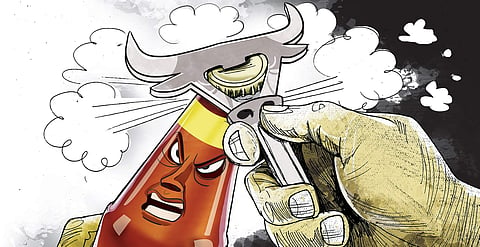

The camera stayed focused on the Chief Minister of Tamil Nadu O Panneerselvam appealing in person to Prime Minister Narendra Modi in Delhi. The appeal sought the intervention of the latter in saving the ancient sport of Jallikattu. Modi is the champion of the ultra-modern destiny of India. He has one leg in the 21st and the other in the 22nd century. We associate him with Digital India and plastic money. He is the engine that pulls India, with Bharat in tow, into modernity.
Modi is the magician of modernity. Jallikattu, in contrast, hails from the dim, distant past. The popular fervour that this issue has activated in Tamil Nadu is far in excess of the importance that this practice has had in the repertoire of Tamil culture. Now, all of a sudden, it looks as if Jallikattu encapsulates a whole culture. Clearly, this is an overstatement. But that is precisely the point! When an issue evokes popular reactions strikingly far in excess of its significance, we need to treat it not literally but symbolically. What it points to is far more significant than what it intrinsically is.
The two most significant events at the present time are Modi’s demonetisation and this pro-Jallikattu popular fervour. They are a study in contrast. Demonetisation is one-mansponsored. It is ultra-modern and abrupt. It has no precedent in scale, scope or impact. It affects a whole nation, every citizen. Jallikattu is ancient and confined to an ethnic unit. The aggression with which demonetisation was unleashed is matched by the fervour with which Jallikattu is demanded. The youth of India are peripheral to demonetisation, whereas they occupy the centre stage in Jallikattu.
The most significant thing about the pro-Jallikattu solidarity is that to the protestors, it is a symbol of Tamil pride. Cultural ‘pride’ holds the key to understanding this ‘Tamil Spring’. Injured pride points to a feeling of hurtful insignificance. Is Tamil pride only a matter of Jallikattu? Is Tamil culture no more than this practice? Surely not! The conclusion then becomes inescapable that the ban on Jallikattu served as a trigger. It triggers an issue relevant far beyond Tamil Nadu.
We pride ourselves on having the largest pool of youth in the world. But we take this demographic segment for granted. The views and aspirations of the youth are suppressed. In JNU, in the University of Hyderabad, they have had to face oppression and intimidation. Rohith Vemula committed suicide. Kanhaiya Kumar survived the fire. Even the BJP’s youth wing is only used, not heeded. The importance a powerful youth movement like the SFI had in Kerala has declined. So there it is: In this age of youth, the youth don’t matter.
The one thing the youth of today will not brook is being ordered about and the directions of their lives determined arbitrarily by others. The age in which they have grown up is rebellious towards authority. Our generation, not the present youth, is largely responsible for degrading the sanctity of life which has aggravated the devaluation of authority. The youth will not be ordered about.
Why should they? It is curious that no one really ascertained the views of India’s educated youth on demonetisation. Managers, corporate honchos, individuals in queues, daily wage workers, housewives have all been interviewed; but not India’s educated youth! The youth of India are adrift. They are immensely talented and aspirational. But they find themselves wandering on a terrain of uncertainty. Given the prevailing unemployment scenario, dealt a death blow by demonetisation, they do not know what to expect tomorrow. For those lucky to find a foothold somewhere, the departure of old certitudes, and the existential emptiness it spews up, are traumatic. The youth are living in a world of existential angst.
A feeling of growing insignificance adds fuel to this fire. In such a context, protest becomes a psychological necessity. The youth of today has as much need to protest as they have to find employment or to fall in love. Right now Jallikattu is the occasion. Tomorrow it will be something else. It is not an accident that the silent volcano has erupted first in Tamil Nadu. The people of Tamil Nadu are peace loving and fiercely self-respecting at the same time. In fact, they are peace loving because they are emotionally rich and culturally well-endowed. In the present context, they feel their life and culture have been interfered with.
If, instead of the apex court banning Jallikattu, the late Jayalalithaa had made an appeal to the people to spare the bulls, the outcome would assuredly have been different. We will misread the present situation if we structure it as Tamil pride vs judicial activism. Not a single protestor resents judicial activism per se. If anything, they would welcome it. They know a tame and servile judiciary will sound the death knell to fundamental rights and democratic entitlements. Devious and covert political mischief is at work in imparting this false spin to the present unrest. An issue of utmost significance has emerged.
How much of our history and past, our culture and spirituality, our identity and authenticity as a people, shall we pawn for the glitter and titillations of modernity? Should we sever our roots to be transplanted into the global village? Can material gains compensate for all that we are robbed of in the process? Is modern culture all sanity and our native cultures a domain only of embarrassment? Shouldn’t we critique the seed of cultural inferiority our colonial masters planted in our collective consciousness and muster up the courage to look at the warts on the faces of the western cultural monolith? How come, as Krishnamachari Srikkanth asked, boxing is not cruelty and Jallikattu is?
Valson Thampu
Former principal of St Stephen’s College, New Delhi
Email: vthampu@gmail.com